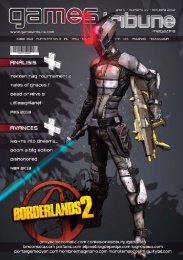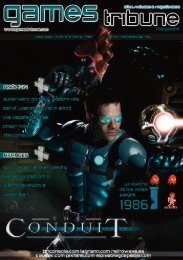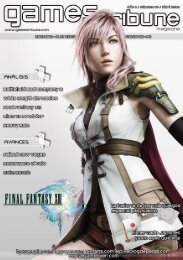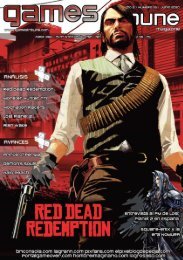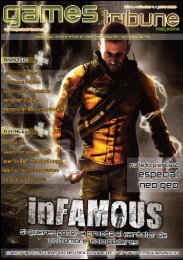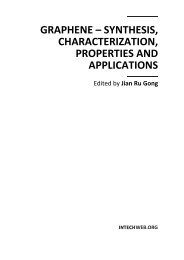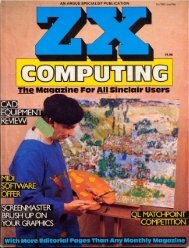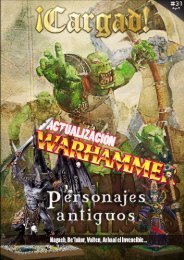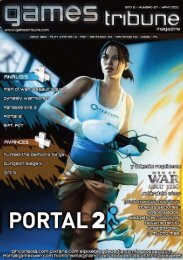- Page 1 and 2:
Well Played 2.0: Video Games, Value
- Page 3 and 4:
Table of Contents Thank You. Well P
- Page 5 and 6:
Introduction Well Played 2.0 More P
- Page 7 and 8:
Cloudmaker Days: A Memoir of the A.
- Page 9 and 10:
abbreviations from the Periodic Tab
- Page 11 and 12:
that curtain was. This decision was
- Page 13 and 14:
experience. The ambivalence I felt
- Page 15 and 16:
special treat: in very faint text w
- Page 17 and 18:
storytelling where the topic is act
- Page 19 and 20:
16 It’s striking that an experien
- Page 21 and 22:
57 http://www.argn.com 58 http://ww
- Page 23 and 24:
the level of interactive engagement
- Page 25 and 26:
he wants the honor and glory for hi
- Page 27 and 28:
cinematics are units that go beyond
- Page 29 and 30:
differs from the first checkpoint).
- Page 31 and 32:
oom that you just saw in the vision
- Page 33 and 34:
Figure 10. Screenshot of the Castle
- Page 35 and 36:
fight, the space is large enough th
- Page 37 and 38:
scenes have more of a pounding elem
- Page 39 and 40:
going to have a successful ending (
- Page 41 and 42:
Interestingly, it doesn’t rewind
- Page 43 and 44:
note, I actually let myself get kil
- Page 45 and 46:
an attempt to inject it into gamepl
- Page 47 and 48:
Team XBox. Prince of Persia: Sands
- Page 49 and 50:
Gray discs require two adjacent bre
- Page 51 and 52:
my own music,[72] or more often, I
- Page 53 and 54:
allows five discs before a new row
- Page 55 and 56:
Chain Factor functioned as the “t
- Page 57 and 58:
I think, what well-designed virtual
- Page 59 and 60:
The genius of this system is that t
- Page 61 and 62:
haunting (and haunted) games I’ve
- Page 63 and 64:
Compared to “Sabre Wulf” and
- Page 65 and 66:
altitude) depending on the moment o
- Page 67 and 68:
Aside from that thread that explora
- Page 69 and 70:
would make anyone feel eager to pla
- Page 71 and 72:
learn on how to jump and take the o
- Page 73 and 74:
DREW DAVIDSON et al. (2008). Beyond
- Page 75 and 76:
her picture. When opening the locke
- Page 77 and 78:
The story advances with the explora
- Page 79 and 80:
Favorite moments Nothing would stop
- Page 81 and 82:
than yourself. Your character is re
- Page 83 and 84:
on presence, flow, and learning. Ho
- Page 85 and 86:
oach did not serve as a distraction
- Page 87 and 88:
game. However, some players felt pr
- Page 89 and 90:
sugary sweets from the picnic blank
- Page 91 and 92:
Csikszentmihalyi, M. (1997). Findin
- Page 93 and 94:
30 square kilometers around the Che
- Page 95 and 96:
Deus Ex and System Shock to set the
- Page 97 and 98:
the dreams,” muses this nameless
- Page 99 and 100:
fails to realize that the Zone is n
- Page 101 and 102:
leak, empty land-scape highlights t
- Page 103 and 104:
The storyline, characters, and even
- Page 105 and 106:
enough. Call of Duty 4: Modern Warf
- Page 107 and 108:
developers utilize environmental es
- Page 109 and 110:
The title of the novel is a referen
- Page 111 and 112:
And yet the same sun, the same moon
- Page 113 and 114:
(www.perimeterpartners.com), Bill H
- Page 115 and 116:
Actraiser Andy Jih While many other
- Page 117 and 118:
simple to dive into: run left and r
- Page 119 and 120:
the only task left is to go to the
- Page 121 and 122:
have ended the game simply with an
- Page 123 and 124:
For an adventure game to succeed, i
- Page 125 and 126:
cinematic, Manny despairs of his lo
- Page 127 and 128:
normal day-to-day life to reach new
- Page 129 and 130:
weren’t completed due to budget a
- Page 131 and 132:
mechanic Elementals that look like
- Page 133 and 134:
gameplay mechanics in Fallout 3. Th
- Page 135 and 136:
with moral dilemmas is done with th
- Page 137 and 138:
contained vignette will also make m
- Page 139 and 140:
One of the most discussed Quests in
- Page 141 and 142:
the grove to help the Wasteland whi
- Page 143 and 144:
weapons lost will change playing st
- Page 145 and 146:
nonexistent, and few gamers I talk
- Page 147 and 148:
Cyan is notorious for baffling play
- Page 149 and 150:
Figure 2: The Cleft in the desert,
- Page 151 and 152:
“writing” Ages, housed in “li
- Page 153 and 154:
ook, that book appears in your Relt
- Page 155 and 156:
visits to solve, each player needs
- Page 157 and 158:
them prideful and greedy. The impli
- Page 159 and 160:
midst and walking down the path. If
- Page 161 and 162:
Figure 17: Decoding the door in Ede
- Page 163 and 164:
As mentioned earlier, central to Ur
- Page 165 and 166:
Immersive Game Design: Indigo Proph
- Page 167 and 168:
compartmentalizes all of the conten
- Page 169 and 170:
immediate connection between player
- Page 171 and 172:
initiating a similar game-ending ev
- Page 173 and 174:
interactions have even greater sign
- Page 175 and 176:
was trying to concentrate on inputt
- Page 177 and 178:
Lions & Jackals: The Politics of Fa
- Page 179 and 180:
Banga, meaning “the all-powerful
- Page 181 and 182:
ealization of what he turned into.
- Page 183 and 184:
Maybe 80% of our players are just l
- Page 185 and 186:
Jeffries, L.B. “Far Cry 2: The He
- Page 187 and 188:
Looking beyond the moments, it is i
- Page 189 and 190:
prowess. There is some level of apt
- Page 191 and 192:
solid short-term goal, much like fi
- Page 193 and 194:
time or exploring the same game lev
- Page 195 and 196:
and seamless; the player is whisked
- Page 197 and 198:
Rasmus: I have an absolute love for
- Page 199 and 200:
feeling that there is something int
- Page 201 and 202:
sessions make it easy to get into t
- Page 203 and 204:
the game sometimes. Isn’t this a
- Page 205 and 206:
Jesper: I would argue that the disc
- Page 207 and 208:
incredibly exciting and rewarding,
- Page 209 and 210:
playing games — ironic, I suppose
- Page 211 and 212:
Sutton-Smith, Brian. 2008. Play The
- Page 213 and 214:
dilemma itself. Should I, the playe
- Page 215 and 216:
Pool of Radiance Sam Roberts Pool o
- Page 217 and 218:
play experience of Pool of Radiance
- Page 219 and 220:
probably at what might be called th
- Page 221 and 222:
containing a moment of choice, is a
- Page 223 and 224:
interpreted, without remaining hide
- Page 225 and 226: Making and Unmaking Place in The Da
- Page 227 and 228: technical accomplishments, the play
- Page 229 and 230: understanding.”[160] Time of day
- Page 231 and 232: ears).[167] Videogames take advanta
- Page 233 and 234: the orphanage, church, warehouses,
- Page 235 and 236: Golden Arm and His Girl Friday, tel
- Page 237 and 238: directions except toward the goal.
- Page 239 and 240: This dynamic is played out in a sho
- Page 241 and 242: 169 Celia Pearce, “Narrative Envi
- Page 243 and 244: ilovebees: Playing and Designing in
- Page 245 and 246: Curious parties falling through the
- Page 247 and 248: Columns of paired numbers appear, l
- Page 249 and 250: may be, they may still need to be n
- Page 251 and 252: strength of its developers and its
- Page 253 and 254: Resident Evil 4: The Mercenaries Mi
- Page 255 and 256: skills at RE4 have earned you the p
- Page 257 and 258: Another important factor that adds
- Page 259 and 260: The strongest pressure on the playe
- Page 261 and 262: • Do I have enough health left to
- Page 263 and 264: New Section Francisco Souki It was
- Page 265 and 266: the game stayed true throughout the
- Page 267 and 268: a reflective Mamma mia! You only ne
- Page 269 and 270: point it all took shape in my head.
- Page 271 and 272: neutral planet, the attacking ships
- Page 273 and 274: want to attempt to play at an exper
- Page 275: abusive language. Most importantly,
- Page 279 and 280: granted by the EPSON Ibérica’s
- Page 281 and 282: and Second Person. He is cited in m
- Page 283 and 284: of Gaming and Computer-Mediated Sim
- Page 285 and 286: designing and developing cross-medi





